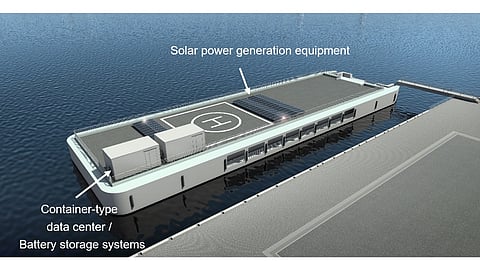

A Eurus Energy-led consortium has proposed a demonstration project for a 100% renewable energy-powered offshore floating green data center
It aims to test the durability and stability of the project that can address land and electricity supply challenges for data centers
Future offshore data centers could be integrated with offshore wind farms to become self-sufficient in their electricity supply
A consortium led by Japanese wind power developer Eurus Energy Holdings has unveiled plans to build a demonstration project for a 100% renewable energy powered offshore green data center off the coast of Japan. Solar and battery energy storage systems (BESS) will power the platform that may be the world’s ‘1st’ offshore floating green data center.
Eurus Energy, along with MUFG Bank, logistics company NYK Line, architecture firm NTT Facilities and the leading port city of Japan, the City of Yokohama, have signed a memorandum of understanding (MoU) for the proposed project.
It is planned to be located off Osanbashi Pier in Yokohama City of Kanagawa Prefecture. The demonstration project will use a 25 m long and 80 m wide mini-float that will house a container-type data center along with solar PV and a BESS system. Construction is planned to begin in autumn 2025.
Through this pilot facility, the consortium aims to assess the equipment’s salt damage resistance and operational stability in an offshore environment.
They explain, “We expect the offshore floating green data center, which operates on 100% renewable energy, will become one of the new standards for future data centers and greatly contribute to the realization of a carbon-neutral society by operating entirely on renewable energy and emitting no greenhouse gases during operation. Through the demonstration, we will work to address various challenges to achieve this vision.”
According to an October 2024 International Energy Agency (IEA) report, data centers account for around 1% of the global electricity consumption, but their future growth may lead to considerable strain on local power networks. This will be exacerbated by the huge mismatch between rapid data center construction times and the sluggish pace of expanding and strengthening grids and generation capacity.
Land availability and stable power supply are among the major requirements for data centers, whose demand has been growing exponentially in recent times. Offshore floating data centers may provide the answer to these challenges, according to the consortium.
The Japanese team recommends that the offshore data centers of the future be located near offshore wind farms to maximize the use of generated electricity without relying on or being limited by onshore power grids.
For the demonstration project, Eurus Energy will conduct a technical feasibility study, NTT will design the data center, NYK will oversee the entire initiative and MUFG will provide financial support. They plan to explore further developments in the waterfront and sea areas of Yokohama port, based on the results of this demonstration project.
